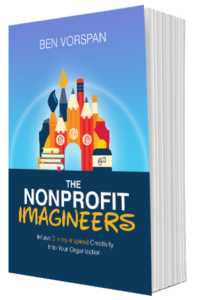
 As you read in chapter 2 of The Nonprofit Imagineers, The Innovator’s Dilemma is a concept introduced by Harvard Business School professor Clayton Christensen in his book of the same name. It refers to the challenge faced by established companies when disruptive technologies or business models emerge, which threaten their current market position.
As you read in chapter 2 of The Nonprofit Imagineers, The Innovator’s Dilemma is a concept introduced by Harvard Business School professor Clayton Christensen in his book of the same name. It refers to the challenge faced by established companies when disruptive technologies or business models emerge, which threaten their current market position.
One recent example of this dilemma is the decision by Facebook/Meta to stop pursuing the development of the metaverse, a virtual world where users can interact with each other and digital objects in a more immersive way than current social media platforms. This decision came as a surprise to many, given the company’s previous statements and investments in this area.
In a blog post titled “Why We’re Focusing on Horizon Workrooms, Not the Metaverse,” Andrew Bosworth, Facebook’s Vice President of Reality Labs, explained the reasoning behind this shift in priorities. He stated that the company had recognized the limitations of current technology and the challenges of creating a truly immersive metaverse experience. He also acknowledged the importance of user privacy and safety, which would be difficult to ensure in a virtual world without clear rules and regulations.
“We realized that creating a metaverse at the scale and level of fidelity we envision will be a multi-decade journey,” Bosworth wrote. “And in the meantime, we need to focus on building products and services that can deliver meaningful experiences to people today.”
This decision was echoed by Facebook CEO Mark Zuckerberg in a recent earnings call, where he emphasized the importance of “building the foundational technologies and products that will enable the metaverse to eventually become a reality,” but also acknowledged that “it’s going to take a while to get there.”
The shift in focus towards Horizon Workrooms, a virtual reality (VR) platform for remote work and collaboration, also aligns with the company’s broader strategy of emphasizing privacy and decentralization. Bosworth noted that Horizon Workrooms is built on an open platform, allowing developers to create their own applications and experiences, and that it does not collect user data for advertising purposes.
“We’re building an ecosystem of VR developers and creators who can push the boundaries of what’s possible with this technology,” he wrote. “And we’re doing it in a way that puts people in control of their own data and privacy.”
The decision to shift away from the metaverse reflects the challenges and trade-offs that established companies face when pursuing disruptive innovations. While Facebook/Meta has the resources and expertise to invest in cutting-edge technologies, it must also balance the risks of investing in an uncertain and rapidly evolving market with the need to maintain its current market position and address the concerns of users and regulators.
As Bosworth stated, “We’ll keep pushing the boundaries of what’s possible with VR and AR, and we’ll keep exploring the potential of the metaverse. But we’ll also stay grounded in the realities of what people want and need today.”
 Celebrate 2 years of Imagineering!
Celebrate 2 years of Imagineering!
Comments are closed